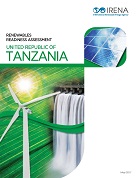Renewables readiness assessment: United Republic of Tanzania
 The United Republic of Tanzania possesses impressive potential for bioenergy, geothermal, solar and wind energy development, in addition to significant existing hydropower capacity. This report advises the country’s energy planners to explore different policy assumptions and investment scenarios, taking into account the latest studies on resource potential and technology costs. Electricity system operation rules need to reflect increased renewable energy uptake via the Southern African Power Pool. The domestic financial sector could be empowered through the Dar-es-Salam Stock Exchange (DSE) to provide equity investments into renewable energy technologies. A framework is needed to enhance facilitation, collaboration and co-ordination among private actors and financial institutions increase knowledge on renewable energy finance. A dedicated risk-mitigation mechanism would boost liquidity support provide investment guarantees for renewable energy projects. The government, meanwhile, is advised to form a national renewable energy centre, establish local-content requirements and explore education and training schemes, including on-the-job training in the sector. A Renewables Readiness Assessment (RRA) identifies the actions needed to overcome barriers to renewable energy deployment, with the International Renewable Energy Agency (IRENA) providing technical support and expertise to facilitate consultations among national stakeholders. While the process helps to shape policy and regulatory choices, each country determines which renewable energy sources and technologies are relevant and consistent with national priorities. According to IRENA’s analysis, the country’s installed capacity of utility-scale solar photovoltaic (PV) and wind power projects could reach 5.6 gigawatts as part of a least-cost energy system by 2030.
The United Republic of Tanzania possesses impressive potential for bioenergy, geothermal, solar and wind energy development, in addition to significant existing hydropower capacity. This report advises the country’s energy planners to explore different policy assumptions and investment scenarios, taking into account the latest studies on resource potential and technology costs. Electricity system operation rules need to reflect increased renewable energy uptake via the Southern African Power Pool. The domestic financial sector could be empowered through the Dar-es-Salam Stock Exchange (DSE) to provide equity investments into renewable energy technologies. A framework is needed to enhance facilitation, collaboration and co-ordination among private actors and financial institutions increase knowledge on renewable energy finance. A dedicated risk-mitigation mechanism would boost liquidity support provide investment guarantees for renewable energy projects. The government, meanwhile, is advised to form a national renewable energy centre, establish local-content requirements and explore education and training schemes, including on-the-job training in the sector. A Renewables Readiness Assessment (RRA) identifies the actions needed to overcome barriers to renewable energy deployment, with the International Renewable Energy Agency (IRENA) providing technical support and expertise to facilitate consultations among national stakeholders. While the process helps to shape policy and regulatory choices, each country determines which renewable energy sources and technologies are relevant and consistent with national priorities. According to IRENA’s analysis, the country’s installed capacity of utility-scale solar photovoltaic (PV) and wind power projects could reach 5.6 gigawatts as part of a least-cost energy system by 2030.
